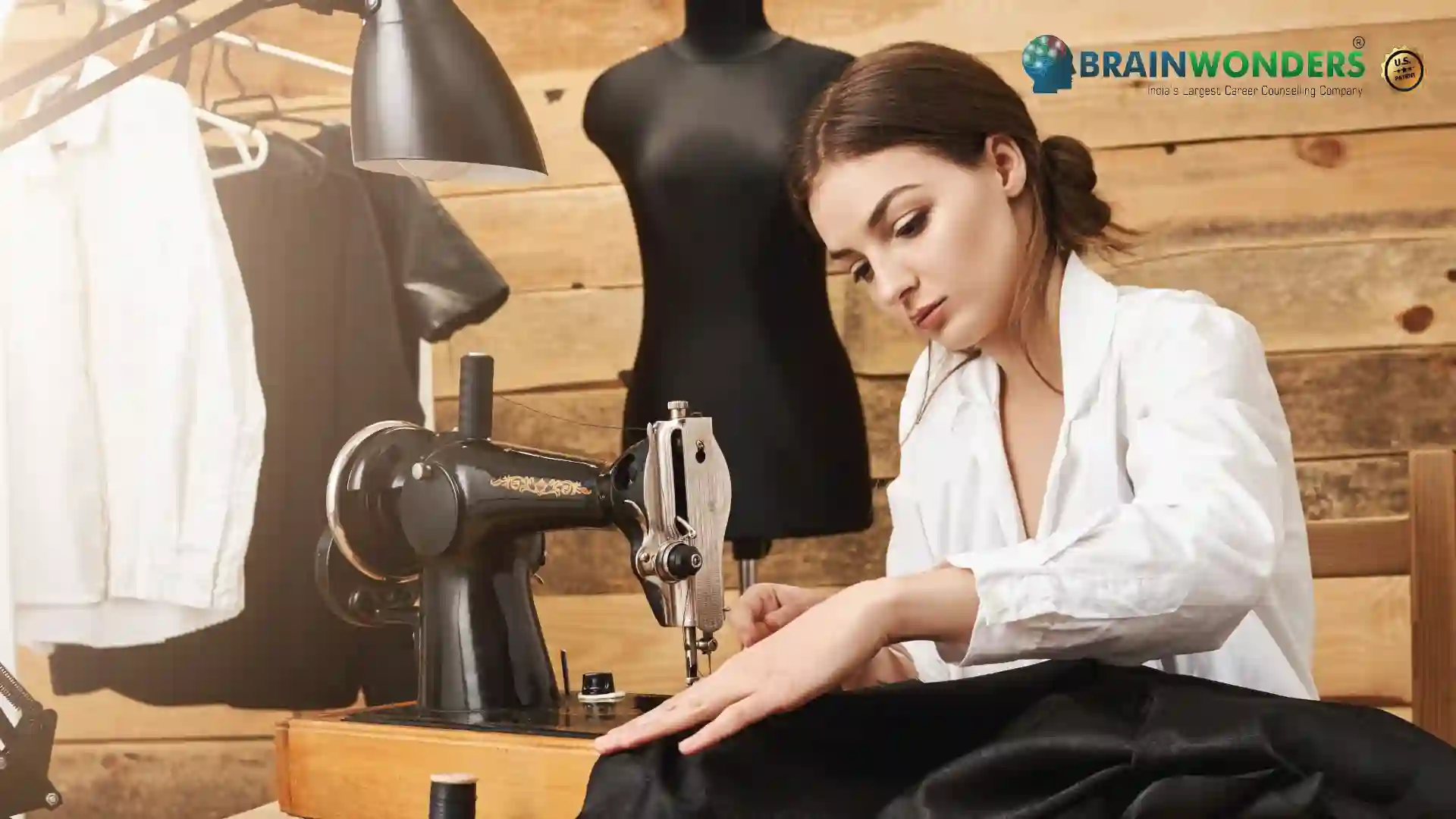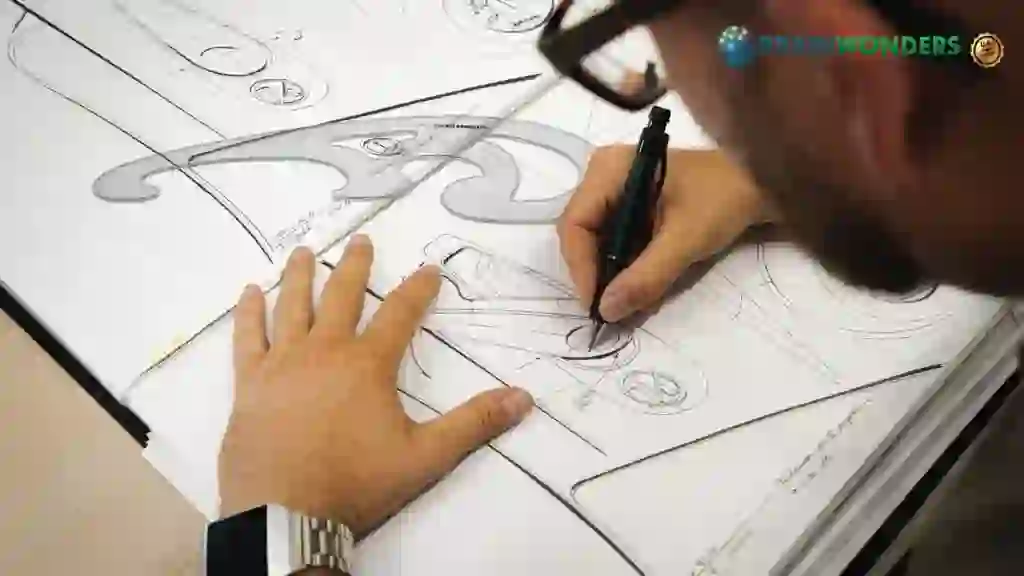How to become a Tailor, Dressmaker, and Custom Sewer
Overview, Courses, Exam, Colleges, Pathways, Salary

Overview
Who is Tailor, Dressmaker, and Custom Sewer ?
Tailors, dressmakers, and custom sewers are skilled professionals who work with fabrics and garments to create, alter, and customize clothing. Here's an overview of each role:
- Tailor: A tailor specializes in creating, altering, and repairing garments to achieve a precise fit. They work with clients to create custom-made clothing or modify ready-to-wear garments to ensure a proper fit and enhance the overall appearance. Tailors have expertise in pattern making, cutting fabric, and sewing techniques.
- Dressmaker: A dressmaker is a professional who specializes in creating custom dresses, gowns, and formalwear. They collaborate with clients to design and construct garments tailored to individual preferences, body measurements, and style choices. Dressmakers often possess advanced sewing and draping skills to bring unique designs to life.
- Custom Sewer: A custom sewer is a skilled professional who works on creating custom-made garments and fulfilling specific sewing requests. They can be specialized in various areas, such as creating tailored suits, crafting bespoke wedding attire, or customizing clothing based on client preferences. Custom sewers combine sewing skills, pattern-making, and attention to detail to create unique pieces.
Typical day at work
What does Tailor, Dressmaker, and Custom Sewer do?
- Suit and review customer's garments to assess appropriate alterations
- Sew the garments utilizing needles and sewing machines or threads
- Measure pieces like pant legs or sleeves, and pin-fold or mark alteration lines
- Pick up or lower hems to, reduce or increase portions of your garment like sleeves
- Take in or let out layers in suits and other clothes to enhance fitting
- Bring together pieces of the garment and fasten sections with stitches, utilizing threads and needles or sewing machines
- Cut stitches from altered clothing, utilizing rippers or razor blades
- Record changes and instructions needed on tags and add them to clothes
- Inspect tags on clothing to assess appropriate changes
- Fit, modify, repair and render custom-made clothing according to the specifications and requirements of clients and clothing manufacturers and utilize the principles of the design, creation and styling of the clothing
- Preserve fabric drape and proportions while altering
- Iron garments utilizing hand ironing machines or pressing devices
- Trim surplus material with scissors
- Create, duplicate, or adjust garment designs and design patterns for appropriate measurements, utilizing knowledge of garment styling, design, construction and fabric
- Make improvements in the dress style, like narrowing lapels, tapering pant legs and adding or eliminating padding
- Measure clients, utilizing tape measures, and write down measurements
- Approximate the cost of producing a garment, based on aspects like time and material specifications
- Repair or substitute damaged pieces of a garment like snaps, pockets, linings, buttons and zippers
- Discuss with clients to decide the kind of material and clothing styles they wish to have
- Place patterns of garment parts on cloth, and cut cloth utilizing scissors along with outlines
- Fasten buttons and sew buttonholes to finish the garments
Abilities and Aptitude needed
What are the skills, abilities & aptitude needed to become Tailor, Dressmaker, and Custom Sewer?
In order to be successful in this industry, students who wish to pursue this profession will be required to practice on a definite skill set. To become a successful tailor, dressmaker, or custom sewer, several essential skills, abilities, and aptitudes are necessary to excel in the field:
- Sewing Skills: A strong foundation in sewing is fundamental. It includes proficiency in operating sewing machines, understanding different sewing techniques, and possessing advanced garment construction, fitting, and finishing skills.
- Pattern Making: Creating or modifying patterns is crucial for tailors, dressmakers, and custom sewers. This skill involves understanding garment design, taking accurate measurements, and translating those measurements into pattern pieces for cutting and sewing.
- Garment Alteration and Tailoring: Expertise in garment alterations and tailoring is vital. It includes the ability to modify garments to achieve proper fit and proportions, perform alterations such as hemming, taking in or letting out seams, adjusting sleeves, and making adjustments based on individual body shapes.
- Fabric Knowledge: A good understanding of different fabrics, their properties, and how they behave during sewing is essential. It includes knowledge of fabric types, characteristics, care instructions, and selecting appropriate fabrics for garments and projects.
- Attention to Detail: Attention to detail is crucial for tailors, dressmakers, and custom sewers. They must work meticulously, ensuring accurate measurements, precise stitching, and consistent seam allowances. Attention to detail is essential for achieving well-fitted garments and delivering high-quality craftsmanship.
- Hand Sewing Skills: Proficiency in hand sewing techniques is essential for intricate details, finishing touches, and fine craftsmanship. It includes hand hemming, invisible stitching, and creating delicate embellishments.
- Problem-Solving Abilities: Tailors, dressmakers, and custom sewers often encounter challenges during garment construction or alteration. They must be able to troubleshoot issues, find creative solutions, and adapt to unique garment designs or customer requirements.
- Customer Service: Interpersonal and customer service abilities are essential for working directly with clients. It includes effective communication, active listening, understanding customer needs, and providing personalized advice and recommendations.
- Time Management and Organization: Tailors, dressmakers, and custom sewers must manage their time efficiently, especially when working on multiple projects or fulfilling client orders. Strong organizational skills, prioritization, and meeting deadlines are crucial for success in this field.
- Continuous Learning: The fashion industry constantly evolves, with new trends, techniques, and technologies emerging. Tailors, dressmakers, and custom sewers should have a thirst for learning, staying updated with industry advancements, attending workshops, and expanding their skills and knowledge.
Pathways
How to become an Tailor, Dressmaker, and Custom Sewer?
Entrance Exam
Entrance Exam for Tailor, Dressmaker, and Custom Sewer ?
Courses
Which course I can pursue?
Best Colleges
Which are the best colleges to attend to become an Tailor, Dressmaker, and Custom Sewer?
Industries
Which Industries are open for Tailor, Dressmaker, and Custom Sewer?
Tailors, dressmakers, and custom sewers can find employment opportunities in various industries demanding garment creation, alteration, and customization. Here are some industries that commonly have openings for these professionals:
- Fashion and Apparel: The fashion industry offers numerous opportunities for tailors, dressmakers, and custom sewers. They can work in fashion design houses, clothing manufacturing companies, boutique fashion labels, and retail stores that offer custom tailoring or made-to-measure services.
- Bridal and Formalwear: Tailors, dressmakers, and custom sewers are often sought after in the bridal and formalwear industry. They work with clients to create and alter wedding gowns, bridesmaid dresses, tuxedos, and other formal attire to achieve a perfect fit.
- Costume Design and Theater: The entertainment industry, including theatre productions, film, and television, relies on tailors, dressmakers, and custom sewers to create costumes. They collaborate with costume designers to bring characters to life by sewing, altering, and customizing costumes.
- Alteration and Tailoring Shops: Tailors, dressmakers, and custom sewers can work in standalone alteration shops or tailoring businesses. These establishments provide individual clients with clothing alterations, repairs, and custom-tailoring.
- Uniform Manufacturing: Industries that require uniforms, such as healthcare, hospitality, and public service sectors, often employ tailors, dressmakers, and custom sewers. They create and customize uniforms to meet specific industry requirements and individual preferences.
- Bespoke Clothing: Tailors and custom sewers can find opportunities in the market for bespoke clothing. It involves creating one-of-a-kind, made-to-measure garments for individual clients who value personalized craftsmanship and unique designs.
- Costume and Fashion Education: Some tailors, dressmakers, and custom sewers may work in educational institutions that offer courses or programs in costume design, fashion design, or sewing. They may teach practical skills and guide and oversee garment creation projects.
internship
Are there internships available for Tailor, Dressmaker, and Custom Sewer?
Internship opportunities for tailors, dressmakers, and custom sewers may be limited compared to other fields. However, some internships may be available in specific industries or establishments related to fashion, costume design, or garment production. Here are a few potential internship options:
- Fashion Design Houses: High-end fashion design houses or brands may offer internships in design studios or production departments. These internships can provide hands-on experience in garment construction, pattern making, and customization.
- Costume Design and Theater Productions: Theater companies, film production studios, or costume design firms may offer internships for individuals interested in costume design and production. Interns can gain experience in creating and altering costumes, working with different materials, and understanding the costume design process.
- Fashion Retailers: Some fashion retailers, particularly those offering custom tailoring or made-to-measure services, may provide internships focusing on garment alterations, fittings, and customer service. Interns may assist with alterations, interact with clients, and learn about the retail side of tailoring and dressmaking.
- Sewing and Alteration Shops: Local sewing and alteration businesses may occasionally offer internships for individuals seeking hands-on experience in garment alterations, repairs, and basic sewing techniques. These internships can provide exposure to the day-to-day operations of a tailoring or dressmaking establishment.
- Apprenticeships and Mentorship Programs: Instead of traditional internships, aspiring tailors, dressmakers, and custom sewers may find apprenticeship or mentorship programs offered by experienced professionals. These programs provide an opportunity to learn directly from skilled practitioners and gain practical garment construction and customization skills.
Career outlook
What does the future look like for Tailor, Dressmaker, and Custom Sewer?
Several factors can influence the future of tailors, dressmakers, and custom sewers. Here's a brief overview of the career outlook for these professionals:
- Niche and Specialized Demand: While the overall demand for tailors, dressmakers, and custom sewers may experience little growth, there will always be a need for their specialized skills. Individuals seeking unique, personalized garments, alterations, and customizations will continue to seek the expertise of these professionals.
- Sustainable and Ethical Fashion: The growing emphasis on sustainable and ethical fashion practices presents opportunities for tailors, dressmakers, and custom sewers. As consumers increasingly prioritize quality over quantity and seek alternatives to fast fashion, there is a demand for custom-made, well-fitted garments that are durable and have a reduced environmental impact.
- Made-to-Measure and Bespoke Services: The demand for made-to-measure and bespoke clothing will persist, especially for special occasions, formalwear, and niche markets. Tailors, dressmakers, and custom sewers specializing in creating unique, personalized garments will continue to find opportunities in this market.
- Entrepreneurship and Independent Work: Many tailors, dressmakers, and custom sewers operate their businesses or work as freelancers. It allows for greater flexibility and the ability to cater to specific clientele and niche markets. The rise of e-commerce platforms and online marketplaces further opens avenues for reaching customers beyond local boundaries.
- Collaboration and Industry Integration: Collaboration with fashion designers, costume designers, and other industry professionals can expand the opportunities for tailors, dressmakers, and custom sewers. Collaborative projects, partnerships, and working with emerging designers or costume production companies can provide new avenues for work and exposure.
- Technological Advancements: Advancements in technology, such as 3D body scanning and digital pattern making, may impact the field of tailoring and dressmaking. Professionals who adapt to these technologies and integrate them into their processes may find enhanced efficiency, precision, and market competitiveness.




